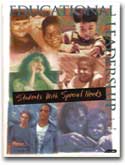Since kindergarten, our 9-year-old daughter, Leah, has attended a “whole language/progressive education school,” as the teachers there describe it. It was clear from the outset that most of them do not believe in much, if any, explicit or isolated instruction and practice in phonics, handwriting, and spelling, especially in the primary grades. No workbooks or published curriculum are used. Most weeks, for example, Leah is required to select and take a test on a number of words, but there is no instruction in spelling patterns, strategies, and word families that can make a real difference (Harris et al. 1995).
We are deeply impressed by many of the school's features—the investment in and control of curriculum that the teachers have, the students' responses to the meaningful activities that fill their days, and the thoughtful and collaborative culture. Teachers there have nurtured our daughter's creativity, thinking, and understanding, with great results.
Skills, on the other hand, have been a problem for our daughter and for other children. At the end of kindergarten, when she had not made much progress in reading, her teacher said she believed Leah had a perceptual problem or learning disability. Leah began asking what was wrong with her, because other kids were reading and she wasn't. Finally, an assessment was done. It did not indicate a learning disability, and in fact showed very strong comprehension abilities. It did, however, show that her word-attack skills were very poor.
Fortunately, we have both been reading teachers, and that summer we taught our daughter to read. We used word-attack activities that were direct, explicit, intensive, and often isolated. And guess what—we had fun! The relationship of these activities to learning to read was clear to Leah, and she was highly motivated.
Within six weeks she was reading Bob Books, a series of engaging little books that use phonetic word families to construct stories—authentic literature in her and our opinion. After that there was no holding her back, and Leah is now a strong reader.
This past summer, as our daughter approached 4th grade, we worked on her labored, nearly illegible handwriting and on memorizing the times tables. Leah really enjoyed working on her handwriting, which is now quite legible, but thoroughly disliked memorizing the times tables. Recently, however, she proudly told us that in a math activity, she was able to complete multiplication problems faster than the class math whiz, and that “packing the facts in your brain really helps.”
Our next goal is to improve Leah's spelling abilities.
Need for an Integrated Approach
For many students who face challenges in learning, behavior, and/or social and emotional development, mastering skills is clearly more difficult than it was for our daughter. These children require more extensive, structured, and explicit instruction to develop not only skills, but also processes, strategies, and understandings (Brown and Campione 1990, Harris and Graham 1996, Kronick 1990).
We strongly support integrated constructivist curriculums and authentic learning environments. For more than a decade, we have worked with local schools to advance the process approach to writing for all students. But we firmly believe that we must provide explicit, focused, and, at times, isolated instruction to the extent needed—and integrate it into the larger literacy context.
Teaching as a Dirty Word
Whole language advocates—and constructivists in general—see children as inherently active, self-regulating learners who construct knowledge in developmentally appropriate ways. They believe that full participation in learning, rather than passive responding, results in deeper and richer understanding and use of knowledge.
Unfortunately, constructivists often see the teacher's role as one of simply assisting performance and the construction of powerful knowledge, rather than explicitly providing knowledge and information. To some whole language advocates, teaching is a dirty word. They believe it is neither necessary nor desirable (and even harmful) to teach explicitly, provide direct explanation, or require practice. This approach has serious ramifications for learners with special needs.
Consider how two whole language teachers approach spelling and handwriting in the context of reading and writing (Manning and Manning 1995). The Mannings say they schedule no separate periods for spelling or handwriting instruction, nor do they give weekly spelling tests. They might provide mini-lessons on letter formations for a group of students experiencing problems, or note a spelling pattern while a student reads. Similarly, they teach word-attack skills only in the context of meaningful reading and writing. They do not use worksheets or other forms of practice, as these are decontextualized and isolated, and thus not meaningful.
The idea, the Mannings explain, is that children develop as spellers as they “read and discuss good literature”: Children who are avid readers, for example, develop a strong knowledge of words, which usually leads to improved spelling. Finally, everyone must remember that spelling is not an end in itself; rather it is the communication of one's thinking (p. 53).
The Best of Everything
Some whole language advocates believe that through rich social interaction and immersion in authentic learning experiences, children will come to learn all they need to know, and develop all of the skills and abilities they need, in due developmental time. This is not a question of the correct way to implement whole language instruction, but rather a fundamental issue in how to apply the philosophy of constructivism in practice (see, for example, Edelsky et al. 1991, Kronick 1990, Poplin 1988).
In successful integrated instruction, by contrast, teachers conduct ongoing assessments of each student's abilities, skills, knowledge, motivation, social characteristics, and prior experiences. They then arrange whatever support children need—from direct explanation through discovery. Children's perceptions of what they are doing and why they are doing it, and of their teacher's intentions, are critical in this integration (Harris and Graham 1994a). Further, integrated instruction is based in learning communities that are educationally purposeful, open, just, disciplined, and caring.
Although some advocates have argued that such integration is impossible and dangerously misguided, many teachers, schools, and communities are demonstrating otherwise. Our own research indicates that in some constructivist classrooms, such integration and attention to special needs learners is reaping very positive results (Graham and Harris 1994, Harris and Graham 1994b).
No Going Back
We do not mean to suggest that we should return to a primarily skills-oriented curriculum.
We both had a taste of that when we began teaching public school in the early 1970s. One of us (Karen) taught 4th grade in a small coal mining community in the Appalachian mountains; the other (Steve) was a resource teacher for 1st through 6th graders in a small southern town.
Steeped in cognitive discovery and humanistic approaches, we were eager to facilitate discussion and inquiry, arouse awareness, stimulate problem solving, capitalize on personal interests, and facilitate discussion and inquiry. We wanted to meet the needs of individual students and to help students clarify their attitudes and values and build positive self-concepts. Unfortunately, we both ran straight into curriculums dominated by skills development and prescribed teachers' guides and workbooks.
Teachers in so many schools like these, where skills have become an end in themselves rather than a part of a larger picture, have seen, as we saw, the toll it takes on children. Recently, the mother of a student with learning disabilities and attention deficit hyperactivity disorder recalled to us the emotional and behavioral costs of the workbook approach that had been used in her son's mainstreamed elementary school classroom: My son suffered so much. All day. Every day. He didn't have what it took to sit for so long and do worksheets. He could do the work. But he didn't have the organizational skills, the ability to pay attention to the teacher and get the directions. And he was punished for things he couldn't control.
My Paradigm, Right or Wrong
What is the effect of whole language instruction or other constructivist approaches (such as process writing/writers' workshops) on the literacy of students with special needs? Unfortunately, the research base is insufficient to draw even the most tentative conclusions (Graham and Harris 1994). Nor can clear conclusions be drawn for other students.
In individual studies, however, researchers have observed many positive outcomes, as have teachers and parents (ourselves included). Among these outcomes: better understanding of the material and the authors' intentions; greater enjoyment of literature; an ability to produce as well as consume knowledge; and—as in our daughter's school—more positive attitudes toward school, and improved thinking and problem-solving skills.
On the other hand, problems with whole language instruction are also becoming well documented. For students who, like Leah, do not face significant problems with learning, behavior, or social/emotional development, the major issue clearly is skills—although difficulties with developing strategies and understandings have also been noted. Parents and educators have voiced concerns about the number of children who have not learned to read naturally by the 1st and 2nd grades, whose handwriting is illegible and labored in the upper elementary grades, and whose spelling remains “inventive” long past the early grades (Smith 1994, Willis 1993).
Why, given what appear to be some obvious problems with whole language approaches, are we not doing more to modify them and avoid the apparent back-to-basics backlash?
One hurdle is a lack of self-criticism. Whole language advocates often encourage teachers to inoculate themselves against criticisms of the approach, and to provide answers to frequent concerns that disavow the validity of these concerns (see, for example, Edelsky et al. 1991, Manning and Manning 1995). Donald Graves (in Newkirk 1994), one of the most influential leaders of the writing process approach, put it well in a recent interview: The thing that bothers me so much about the whole language movement is that it is not self-critical. I have dire predictions for the movement. There's been terrific stuff done, and there's been a belief in teachers that has been strong. But there has to be far greater intellectual demand on the movement than we've had (p. 23).
Some teachers conclude that if a student has problems with the whole language approach, there must be something wrong with the student. Such thinking may increase referrals to special education or tutoring services. Kronick (1990) noted that constructivism may lure some teachers into believing that individual differences are neither real nor even problematic and that difficulties will resolve themselves in due developmental time.
Then, there are those who believe that constructivism is the key to increased justice and democracy in the world (Edelsky et al. 1991). They even contend that, say, 13 years of constructivist education would lead to less crowding in our prisons and help to control the federal deficit and the drug problem (Kamil et al. 1994). We are less sanguine.
Graves (in Newkirk 1994) discussed the difficulties engendered by orthodoxies within any viewpoint, and particularly within the whole language viewpoint. When people who subscribe to one approach are incapable of examining it critically, and when their behavior is insular, they may well ignore the knowledge gained by practitioners of competing or alternative paradigms. That could have dangerous consequences.
No All-Purpose Path
The challenges faced by students with special needs, and indeed by all of us, are complex. No one intervention or viewpoint can address the complex nature of school failure or success, or, for that matter, of social inequalities and inequities. We, like other advocates of constructivism or whole language (Harris and Graham 1994a), believe that an integration of knowledge and successful practices is critical in today's schools.





